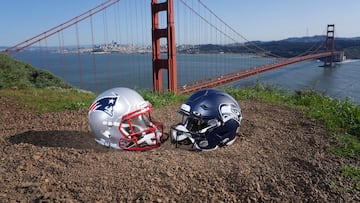How are Super Bowl cities selected?
Following the news that Super Bowl LVII will be held in Atlanta, Georgia, we look at the history of venues selected for the NFL’s showpiece game.

Highest ranked team? Largest capacity? Decent weather? Presidential choice? Have you ever pondered why a particular venue is chosen for the Super Bowl each year?
The NFL has already mapped out its biggest event years in advance, and as of 2026 the roadmap is clear: Santa Clara, California is the venue for Super Bowl LX in 2026, Los Angeles will host Super Bowl LXI in 2027, and Atlanta, Georgia has been selected to stage Super Bowl LXII in 2028. Atlanta’s selection will mark the fourth time the city has hosted the game, but who actually makes that call?
There is a lengthy process to select the host city but it essentially boils down to a vote of the owners from all 32 NFL teams.
Does the NFL pick host cities based on weather?
The truth is that the Super Bowl venue decision used to be very much a weather-related decision. With the season coming to its climax in February, areas with a lot of sun were considered more likely to get the nod. As such Alaska has traditionally been unlikely to be selected.
The warmer climes of Miami, New Orleans and Los Angeles have seen them lead the way with the number of Super Bowls. The Greater Miami area for example hosted for their 12th time in 2021, while New Orleans has taken charge on ten previous occasions and the Greater LA region seven times.
Do cities have to bid for the Super Bowl?
Weather, however, is not the only deciding factor. Instead, candidates must stake their claim to be a suitable venue for the showpiece event on the NFL calendar.
In the past, the NFL would invite cities to make a bid. From those that did, the options would be whittled down by the league to a few ‘finalists’ who would then be asked to submit their presentation. These documents - which can be up to 600 pages and take around a year to compile - would then be reviewed and decided upon by the 32 team owners.
In recent years, though, this model has changed. Since 2018, the large-scale competition was done away with and the NFL now contacts a potential host city and asks them to put together a suitable proposal. The owners then vote to accept or deny.
Seattle Seahawks vs New England Patriots live: Super Bowl LX
What are the rules for Super Bowl host cities?
Despite the more ‘managed’ nature of the new selection process, there are a few cast-iron rules for prospective Super Bowl host cities.
Despite regular rumours that the Super Bowl may be headed for one of the world’s iconic sports venues - Wembley in London, Mexico City’s Azteca, or Madrid’s Santiago Bernabéu - that is never going to happen. The first stipulation in the NFL’s bidding process rules it out entirely. Here are the key conditions for a bidding city.
• The host stadium must be in a market that hosts an NFL team and must have a minimum of 70,000 seats, with the media and electrical amenities necessary to produce the Super Bowl. Stadiums may include temporary seating for Super Bowls, but seating must be approved by the league. Stadiums where the average game day temperature is below 50 °F (10 °C) must either have a roof or a waiver given by the league. There must be a minimum of 35,000 parking spaces within one mile of the stadium.
• The host stadium must have space for the Gameday Experience, a large pregame entertainment area, within walking distance of the stadium.
• The host city must have space for the NFL Experience, the interactive football theme park which is operated the week prior to the Super Bowl. An indoor venue for the event must have a minimum of 850,000 square feet (79,000 m2), and an outdoor venue must have a minimum of 1,000,000 square feet (93,000 m2). Additionally, there must be space nearby for the Media Center, and space for all other events involved in the Super Bowl week, including golf courses and bowling alleys.
• The necessary infrastructure must be in place around the stadium and other Super Bowl facilities, including parking, security, electrical needs, media needs, communication needs, and transportation needs.
Related stories
• There must be a minimum number of hotel spaces within one hour’s drive of the stadium equalling 35% of the stadium’s capacity, along with hotels for the teams, officials, media, and other dignitaries. (For Super Bowl XXXIX, the city of Jacksonville docked several luxury cruise liners at their port to act as temporary hotel space).
• There must be practice space of equal and comparable quality for both teams within a twenty minute drive of the team hotels, and rehearsal space for all events within a reasonable distance to the stadium. The practice facilities must have one grass field and at least one field of the same surface as the host stadium.


Complete your personal details to comment